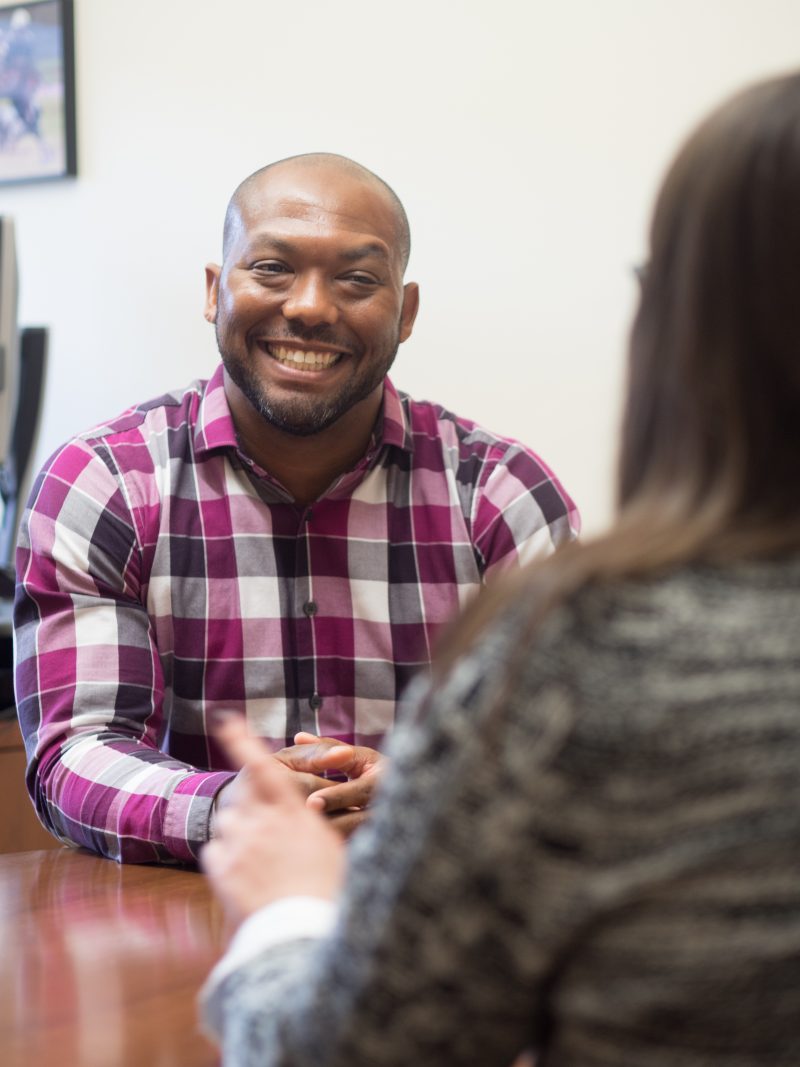When you were a senior in high school, chances are you would have given a lot for a peek into the head of a college admissions officer. They are, after all, the enigmatic card-holders to your future life as a college student. Who wouldn’t want to know what they’re thinking, even now that your college future is set?
Well, although telepathy isn’t possible, we can give you a glimpse into what a normal day is like for your friendly neighborhood — i.e. Trinity — admissions counselor.
Though, “normal” is a subjective term, said counselor Jesse Gamble.
“When you ask that question ‘what does a day in our life look like,’ I have to ask ‘what season?’” Gamble said.
He explained that from August to December, most of the time, the admissions counselors are out of the office. They travel to their different territories and work mainly on recruiting. A typical day during this season involves visiting four to five high schools and trying to interact with as many students as possible.
“Sometimes it’s us sitting at a table in a cafeteria during lunch hour with a banner and people hoping to come and talk to us, sometimes it’s by appointment, when kids sign up ahead of time and come in and chat with us in a room in a library or a private counselor’s office or something like that,” Gamble said.
Gamble added that this season also includes many networking events like alumni dinners, events for prospective parents, college fairs, interviews with students and update-meetings with groups of high school counselors.
Gamble’s territory covers a wide range, from Midwest cities such as Chicago and Minneapolis, to cities in California like San Diego and Los Angeles, and even to a few cities in Mexico. That distance doesn’t matter once the first round of applications comes in, though.
“That month of November, whether we’re here or whether we’re on the road, it’s a lot of reading applications,” Gamble said.
This reading phase continues until April 1. During this time, the counselors devote the majority of their days to reading through applications, though they trade off doing information sessions for prospective students and families.
It’s during this period of time that Jeremy Boyce, coordinator of athletic recruitment and student success, gets to do his favorite part of the job. Boyce is a special kind of admissions counselor who works with student athletes and their families to help them navigate the unique set of concerns that they face during the college admissions process.
This time of year, he usually gets to work at around 8:30 a.m., answers emails and listens to phone calls. Soon after, he usually gets a phone call from a coach, telling him that a prospective student athlete is on campus and asking him to talk to the student about admissions and financial aid.
“We try and make sure that when a student comes to Trinity, we know they’re coming, and they feel like ‘Hey, the admissions people knew we were coming’ and we come out and we chat with them and have a little bit of a conversation with them before the day gets going, just kind of really welcoming them to the campus and making it more of a personalized experience,” Boyce said.
Boyce explained that these visits allow him to help families understand the financial picture at Trinity. As a Division III school, Trinity is not allowed to give athletic scholarships, so it’s Boyce’s job to be realistic with families about other kinds of financial aid, especially academic merit aid.
“Since we recruit pretty talented student athletes, talented athletically but also more importantly academically, we tend to get students who are getting a good amount of merit aid,” Boyce said.
Even these smart athletes need some help learning how to balance the rigors of college coursework with being a college athlete. That’s where another aspect of Boyce’s job comes in. Last semester, he taught one of the Academic Success workshops for football players. These workshops teach study skills, time management, and general ways to handle the transition into college life.
“Instead of saying ‘hey hope you guys can figure that out when you get here,’ this is something to help them make sure they do it. And it actually has been pretty successful; we’ve seen a constant GPA rise for all the first years since the year we started doing it, so it’s effective,” Boyce said.
Wyatt Messex, first-year second-string quarterback, appreciated the workshop.
“I am glad I took part in it. I think that the skills I learned have already made an impact on what I have done so far in college and honestly had a greater impact on me than my FYE,” Messex wrote in an email interview.
Working with successful student athletes like Messex is what Boyce enjoys most about his job. In fact, both Boyce and Gamble love the social aspect of their jobs.
“I think one of the most fulfilling parts of it is when you’re actually working with students and you help them realize that their goal of being here is going to be a reality for them,” Boyce said.
Gamble especially loves meeting people through their applications.
“Even though I spend a lot of time looking at a computer screen, it’s learning about different people. It’s that wonderful moment when I read an application and next Tuesday there’s a student coming in from Iowa named Garrison and I’ve read his application but I’ve never met him in person. So that wonderful moment when I’m like ‘oh you’re Garrison!’, that’s really one of the things that I enjoy most about this job,” Gamble said.







